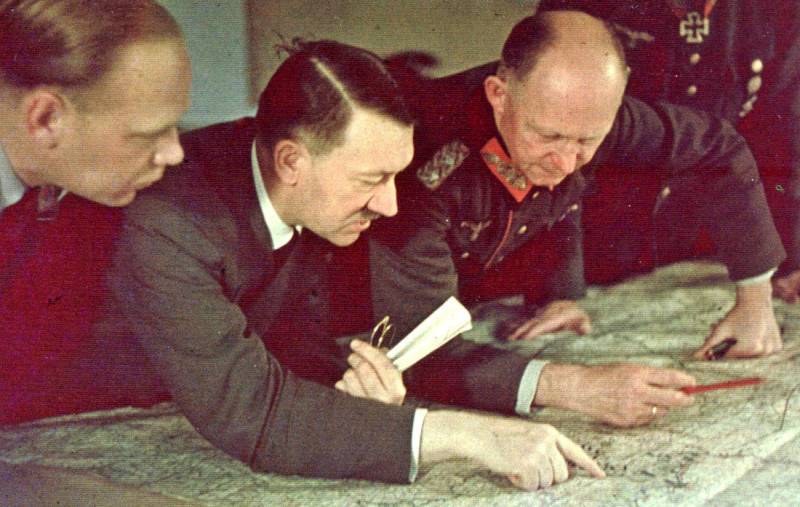The riddle of history: why did Hitler not touch Switzerland?
As you know, Switzerland during the Second World War was neutral. Why, then, the mountainous country, famous since the Middle Ages for its warlike mercenaries, did not oppose Hitler, but did not fall under his banner?
At the Vienna Congress of 1814-1815, when the post-war borders of states were redrawn, Switzerland declared its neutrality. For a small confederation, whose population speaks four languages, this was the most sensible decision. Swiss history experts ask a rhetorical question:
Indeed, the famous Swiss pastoral confirms the benefits of permanent military neutrality. But there is one “but”:
Adolf Hitler called the Swiss disgusting and miserable, failed branch of the great German people. After the defeat of France from Nazi Germany, Switzerland was easy prey for the Wehrmacht. Plans were developed to capture this small country, whose armed forces totaled only 24 tanks and 90 Messerschmitt fighters, bought from the Germans. However, the Fuhrer did not give an order to seize Switzerland.
Opinions on the reasons for this vary. On the day of the official surrender of Germany in 1945, the commander-in-chief of the Swiss army, Gisan declared that this small, but bold army of a mountainous country was the main reason that the Nazis were afraid to invade and occupy it. A contemporary of those events, Hans Meister, claims that the Germans first overestimated their strength, but came to their senses in time:
But there are other opinions about this. Despite the fact that there were a minority of supporters of the ideas of Nazism in the confederation, the tone policy countries asked the right-wing bourgeoisie. While ordinary Swiss were ready for resistance, the "elite" of the country showed willingness to adapt. The country's authorities returned their citizens from the trenches, demobilized and sent to factories and factories to work for the Germans.
Swiss industry received contracts with Nazi Germany and Italy, Axis allies began to be supplied with weapons produced in the confederation. Loyal to the Germans, the Swiss authorities ensured transit through the Alpine mountains, "laundering billions" through the state financing system, and the purchase of gold that later became famous banks.
Swiss “neutrality” during the Second World War looks more like a gesheft by its elites from mutually beneficial cooperation with the Nazi regime.
At the Vienna Congress of 1814-1815, when the post-war borders of states were redrawn, Switzerland declared its neutrality. For a small confederation, whose population speaks four languages, this was the most sensible decision. Swiss history experts ask a rhetorical question:
Tell me: where are the traces of the bombing in any of the Swiss cities?
Indeed, the famous Swiss pastoral confirms the benefits of permanent military neutrality. But there is one “but”:
Neutrality only makes sense when other powers recognize it.
Adolf Hitler called the Swiss disgusting and miserable, failed branch of the great German people. After the defeat of France from Nazi Germany, Switzerland was easy prey for the Wehrmacht. Plans were developed to capture this small country, whose armed forces totaled only 24 tanks and 90 Messerschmitt fighters, bought from the Germans. However, the Fuhrer did not give an order to seize Switzerland.
Opinions on the reasons for this vary. On the day of the official surrender of Germany in 1945, the commander-in-chief of the Swiss army, Gisan declared that this small, but bold army of a mountainous country was the main reason that the Nazis were afraid to invade and occupy it. A contemporary of those events, Hans Meister, claims that the Germans first overestimated their strength, but came to their senses in time:
The cost of conquering Switzerland would be too high, definitely
But there are other opinions about this. Despite the fact that there were a minority of supporters of the ideas of Nazism in the confederation, the tone policy countries asked the right-wing bourgeoisie. While ordinary Swiss were ready for resistance, the "elite" of the country showed willingness to adapt. The country's authorities returned their citizens from the trenches, demobilized and sent to factories and factories to work for the Germans.
Swiss industry received contracts with Nazi Germany and Italy, Axis allies began to be supplied with weapons produced in the confederation. Loyal to the Germans, the Swiss authorities ensured transit through the Alpine mountains, "laundering billions" through the state financing system, and the purchase of gold that later became famous banks.
Swiss “neutrality” during the Second World War looks more like a gesheft by its elites from mutually beneficial cooperation with the Nazi regime.

Information